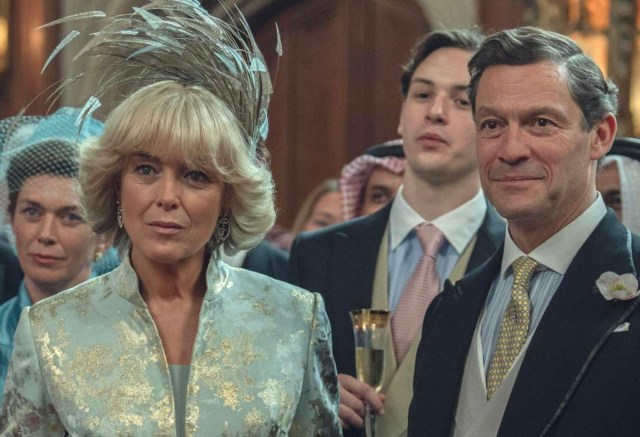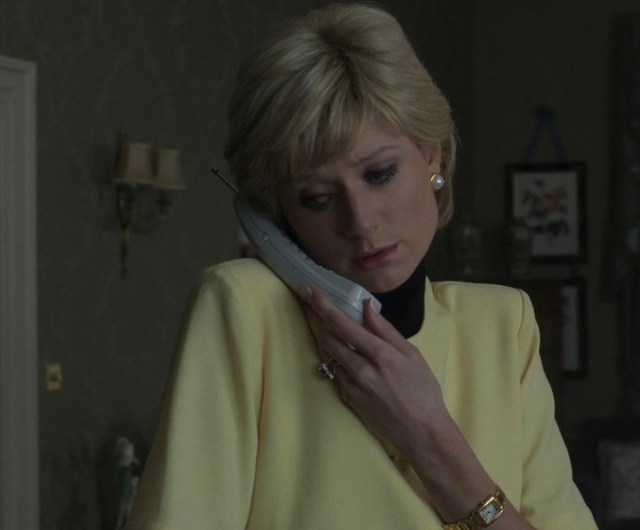Though creator Peter Morgan once had “low expectations” for the historical drama about the British royal family, the series ultimately proved magnetic for critics and audiences alike, affording tantalizing glimpses into Queen Elizabeth II’s early private life. After a buzzy 2016 debut, the series notched five Emmy noms for its first season and even nabbed a supporting actor win for John Lithgow. It generated jokes, memes, and numerous historical-minded think pieces, and crucially catered to multiple demographics. Moreover, as one of Netflix’s first critically acclaimed hits to follow House of Cards, it solidified the streamer as a force to be reckoned with. By all accounts, it seemed poised to become a driving force in television history.
Then Peter Morgan ruined it.
The problems began when, as The Guardian put it, the show “caught up with modern times.” One might rightfully carbon date that to the third or fourth season when the show began portraying events that viewers remembered. Until the third season, the show had remained firmly in the ‘40s, ‘50s, and ‘60s (an underreported time in the royal family’s lives). Though a compelling era, it also provided an easy pretext for Morgan to fabricate private conversations between Elizabeth II (Claire Foy) and her new husband, Philip (Matt Smith). After all, who would question the accuracy? But when the series moved forward into the ‘70s of Season 3, viewers began recalling the show’s events differently. Accusations of historical inexactitude and sensationalism began; Morgan went on the defensive. “I can only repeat what I have always said,” Morgan recently told The New York Times. “Some of it is necessarily fiction. But I try to make everything truthful even if you can’t know if it’s accurate.”
But the issue wasn’t that Morgan took some creative liberties. It was that he spun his series into an extended PR campaign for the royal family. Whereas Seasons 1 and 2 portrayed the royals as complex and often difficult characters, Seasons 3 and 4 laid the groundwork for them to redeem themselves, potentially putting Morgan in the royal family’s good graces. Though Morgan had always revered Elizabeth II – see his sympathetic portrayals of her in The Queen and The Audience – he also now felt the urge to make Charles charming and Anne likable and the Duke of Windsor empathetic. In other words, he had begun writing fiction. Or, at least, he was honoring his personal agenda in lieu of reflecting what the public believed.
As The Crown continued to speed along its 60-year timeline, these aforementioned issues became more apparent. Dominic West, the actor who played Prince Charles in the series’ final two seasons, was accused of being too handsome, charming, and intelligent to reasonably play his character. (One could only hope to receive such criticism in life.) The casting was deemed royal bootlicking by members of the press. Additionally, during Charles’s divorce from Princess Diana, the People’s Princess, the character came off as a tragic heartthrob or rakish teddy bear, rather than the cruel, bumbling man that the public recalled from that era. Of course, it’s entirely possible that Charles did act like a rakish teddy bear during those years, but why did Morgan suddenly change his tack? The man was loath to speculate on accepted history at other points in the series, so why the need to portray Charles in a way contrary to his public image? Then Morgan transformed Charles’s mistress Camilla from a self-centered hedonist into a stoic, saintly figure worthy of a Nobel Peace Prize, leading many to speculate that Morgan was just trying to cozy up to the future King and Queen of England.

By the recent final season, though, Morgan had diluted any remaining criticism towards the royal family, essentially converting his series into a hagiography. Prince Philip, famously irascible and racist, was now a kindly, sensitive patriarch, delivering fictional wisdom to a young Prince William during Diana’s funeral. As for Charles, he was suddenly a “raw, broken, and handsome” PR strategist who intuitively understood the minds of the British public. Even the Queen’s portrayal was skewed, although in the oddest way possible. Known as a modernizing force at Buckingham Palace in her later years, Elizabeth II in Season 6 of The Crown was merely a staunch traditionalist and emblem of austerity. And as for Prince Andrew – the real symbol of royal rot – the series resoundingly said, “Who?”
In perhaps his most egregious bit of royal PR, Morgan began painting non-royals as antagonists on his show. Prince Harry, now famously estranged from his family, became a bratty troublemaker. Carole Middleton, known publicly for her modesty and unyielding support of her daughter, Kate, became a controlling mother and toxic social climber. Dodi and Mohamed Al-Fayed, two of the series’ few people of color, became racist caricatures of effete, manipulative misogynists. In a head-spinning turn of events, the two even shouldered some blame for Diana’s death. In reality, there’s no record of Dodi ever proposing to Diana, but Peter Morgan insinuated that this event led directly to her demise.
At its best, The Crown always made the case that the Crown itself – with its attendant riches, fame, and responsibility – was the true antagonist of this story. Who could ever forget Princess Margaret’s tragic split from Peter Townsend? But now that Morgan needed to get his knighthood or whatever, he preferred to drop that line of thought. With the arrival of Season 6, Morgan’s trenchant criticisms of the royal family – often a distillation of The Crown’s viewers’ own thoughts – became distant memories. Instead of hearing the Duke of Windsor call the royal family, as he had previously, “a bunch of ice-veined monsters … cold and thin-lipped and dumpy and plain,” viewers got to watch a ghost version of Diana tell Prince Charles what a handsome, special hero he was. It was almost as if Charles had written the scene himself.
And speaking of Ghost Diana, she was probably the final season’s biggest misstep. There was no need to veer into the supernatural on this show, and any TV creator worth their salt would know that a surprise ghost character can sully an otherwise straight-faced, Emmy-winning drama. (See: Grey’s Anatomy). But that’s no matter: Morgan was running on empty, after all. He had always planned to end The Crown after five seasons, and thus needed to improvise for this final chapter. The result, Ghost Diana notwithstanding, was a parade of hurried, insubstantial story beats reminiscent of fanfic written by AI. Princess Margaret’s death was literally a title card.

While we’ll never know if Peter Morgan used AI to write Season 6 of The Crown, we can at least surmise that he’s lost his former touch. Sadly, this also means that the show will pass out of public memory. Sure, The Crown launched multiple careers and generated memes of royal wittiness, but it ultimately never challenged the status quo. As soon as the series began to idolize its subjects in front of its increasingly populist-minded viewers, it lost its ability to do so. Plus, if Morgan had only read the room, he might have realized that the very meme-makers who’d made his show into a hit might have appreciated a nod toward Harry and Meghan’s recent royal truth bombs. At the very least, Morgan could have spent more time exploring the anachronisms of an institution that many contemporary viewers found elitist and inessential. No one, save for the most loyal royalists, needed to watch a series that championed hereditary wealth. The result was a swan song without a tune – and no one was listening. The final season’s viewership numbers were proof. As the final nail in its coffin, the series’ controversial, unabashedly racist depictions of the Al-Fayeds will ensure that it doesn’t age well.
Of course, this all could have been prevented. Morgan could have used his platform to destabilize a longstanding, problematic institution. And even if he did want a personal lunch invite from Prince Charles so badly, he could have at least made more salient points about his subjects. Thankfully, his excellent first two seasons will speak for themselves as he pursues further projects. And, hopefully, he won’t need to suck up to any rich people next time.


0 Commentaires